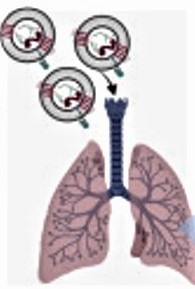Respiratory diseases are a global burden, with millions of deaths attributed to pulmonary illnesses and dysfunctions. Therapeutics and vaccines have been developed, but they present major limitations regarding pulmonary bioavailability and product stability. To circumvent such limitations, Researchers developed room-temperature-stable inhalable lung-derived extracellular vesicles or exosomes (Lung-Exos) as exosomal drug carrier of mRNA and protein drugs.
Exosomes are membranous nanovesicles of endocytic origin released by most cell types from diverse organisms. Exosomes are present in many and perhaps all biological fluids, including blood, urine, and cultured medium of cell cultures. Exosomes play a critical role in cell-cell communication. There is a growing interest in the clinical applications of exosomes. Exosomes can potentially be used for prognosis, therapy, and biomarkers for health and disease.
Exosomal drug carrier
Research in extracellular vesicles (EVs) is important to the field of translational medicine to develop therapeutics that are limited by poor cellular targeting and efficacy. The biological composition of EVs can be exploited as drug-delivery vehicles that may be engineered for cellular targeting or eliciting specific immune responses through their functions in membrane trafficking and cellular signaling.
With the molecular composition of EVs varying depending on their parent-cell origin, the derivation of EVs can further refine nanomedicine by utilizing nanoparticles that are recognized by specific cellular microenvironments. EVs are found in almost all biological fluids, opening the application of EVs as tailored drug-delivery vesicles to a wide range of diseases. The molecular cargo of exosomes can be tailored to treat or vaccinate against a specific disease.
Lung extracellular vesicles (Lung-Exos) can package mRNA and protein drugs. Lung-Exos are deliverable through nebulization and dry powder inhalation. Dry powder Lung-Exos are room-temperature stable up to 28 days. Drug-loaded Lung-Exos can serve as an inhalable vaccine to illicit immune responses.
Compared with standard synthetic nanoparticle liposomes (Lipos), Lung-Exos exhibited superior distribution to the bronchioles and parenchyma and are deliverable to the lungs of rodents and nonhuman primates (NHPs) by dry powder inhalation.
In a vaccine application, severe acute respiratory coronavirus 2 (SARS-CoV-2) spike (S) protein encoding mRNA-loaded Lung-Exos (S-Exos) elicited greater immunoglobulin G (IgG) and secretory IgA (SIgA) responses than its loaded liposome (S-Lipo) counterpart. Importantly, S-Exos remained functional at room-temperature storage for one month.
These preclinical results suggest that extracellular vesicles can serve as an inhaled mRNA drug-delivery system that is superior to synthetic liposomes.
Source: Popowski, K.D. et al. (2022) Inhalable dry powder mRNA vaccines based on extracellular vesicles. Matter. DOI: https://doi.org/10.1016/j.matt.2022.06.012
See also: Exosome Databases.
